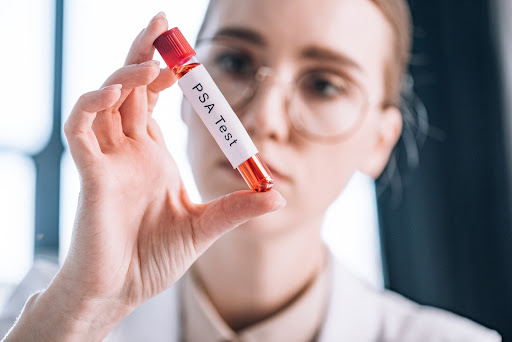At KCUC, we deliver comprehensive, compassionate, and state-of-the-art care for individuals navigating the challenges of prostate cancer. We’re dedicated to ensuring that you receive personalized care that addresses your unique needs and concerns.
Prostate cancer is a prevalent issue among men, and early detection is crucial for successful treatment. The first step is getting your PSA levels tested.
Our team of dedicated urologists, oncologists, and healthcare professionals is committed to guiding you through every step of the way. From routine screenings to advanced treatment options, we’re here to support you in making informed decisions about your prostate health.
Whether you need preventive screenings, diagnostic evaluations, or ongoing prostate cancer care, KCUC is your trusted partner, dedicated to your well-being. Your health is our priority, and together, we can navigate the path towards a healthier, happier future.
Elevated PSA & Prostate Cancer Risk Factors
Factors that may increase your risk of prostate cancer and elevated PSA levels include:
- Family history — having a brother, father, grandfather, or son with prostate cancer
- Age — 90% of prostate cancers are diagnosed in men 50 and older
- Race — African Americans are at greater risk
- Diet and lifestyle — obesity and/or a diet high in saturated fats has been associated with more aggressive prostate cancer. Eating fruits and vegetables high in antioxidants such as broccoli and cauliflower may decrease risk.
Please note that an enlarged prostate (benign prostatic hyperplasia or BPH) does not increase your risk of prostate cancer.
Screening & Symptoms of Prostate Cancer
Early-stage prostate cancer often has no warning signs and can only be found through routine testing such as a rectal exam (DRE) and PSA, (prostate-specific antigen) a protein that may be elevated in men with prostate cancer. The PSA test determines the level of a protein, PSA, in a blood sample; high levels could indicate prostate cancer and may require further testing. Keep in mind though that other benign conditions such as an enlarged prostate or prostate infection may also elevate this test. Despite this lack of specificity, PSA testing remains a useful test to help detect prostate cancer before it spreads outside the gland.
Because many men with prostate cancer are diagnosed at early stages and the fact that prostate cancer often grows slowly, recent publications have highlighted the risks of over-diagnosis and over-treatment, which may cause more harm than good. However, prostate cancer is still a lethal disease for over 30,000 men each year in the United States. A more measured approach to early detection has been published by the American Urological Association (AUA) and is outlined below.
- Screening for prostate cancer before age 40 is not recommended (men with a strong family history or symptoms could be an exception)
- Men age 40 to 54 with high risk (family history, African American men) may benefit from early detection.
- Men age 55 to 69 will have the greatest benefit from early detection. KCUC recommends annual PSA and DRE for men with average risk and every 6 months for men with high risk.
- Men over the age of 70 will have the least amount of benefit from early detection with PSA. Exceptions are men at high risk and those in exceptionally good health. KCUC recommends having a discussion with your doctor (shared decision making) to see if PSA testing in Kansas City is appropriate for you.

Diagnosis and Staging
If further evaluation is needed after the screening tests, a prostate biopsy or prostate MRI (Magnetic Resonance Imaging, similar to CT scanning but without radiation) may be recommended. If the MRI reveals a lesion with a high risk of cancer, then a fusion biopsy may be recommended. During fusion biopsy, the MRI images are overlapped (fused) with real-time ultrasound images and the lesions seen on MRI can be targeted with a great deal of accuracy. Samples of the prostate obtained in this manner are mapped out and sent to pathology for diagnosis. If prostate cancer is found during the biopsy, additional testing such as a bone scan or a CT scan may be recommended.
The biopsy report will determine the cancer grade. This is the “Gleason Score” that estimates the aggressiveness of the cancer based on microscopic features. This grade will also determine the type of prostate cancer treatment recommendations.
If there’s a cancer diagnosis based on the DRE, PSA, grade, and imaging results, a cancer grouping is determined, and the stage of cancer can be predicted.
In its early stages (T1 and T2), prostate cancer is usually confined to the prostate itself. As the cancer advances, it may move outside the prostate to surrounding tissues, lymph nodes, bones, or other parts of the body (Stage T3 or T4). Prostate cancer treatment success reduces as the cancer stage increases.
Prostate Cancer Treatment – What are your options?
Many effective prostate cancer treatments exist today. With early detection, many patients can be cured. The most appropriate treatment plan for you will depend on factors such as your PSA levels, age, health, lifestyle, and the characteristics of your cancer.
Your Prostate Cancer Treatment Options Include:
- Active Surveillance (watchful waiting) — men with slow-growing, early-stage cancers (usually cancer group 1 or 2) or those with serious health problems or advanced age may be advised to monitor the cancer rather than actively treating it. Many men will “outlive” their prostate cancer.
- Surgery — a surgical procedure called a radical prostatectomy removes the cancerous prostate gland, surrounding tissues, and often lymph node sampling. The surgeons of KCUC, P.A. use the latest techniques to remove cancerous tissue while minimizing side effects. These techniques include the nerve-sparing prostatectomy that can be performed through a traditional “open” prostatectomy or with the aid of the da Vinci robot through a laparoscopic approach.
- Radiation therapy — At our Cancer Center, we offer integrated cancer treatment for a variety of cancers using the collaborative expertise of multiple specialists, including urologists, medical oncologists, and radiation oncologists. State-of-the-art technologies are used to evaluate and treat these cancers using proton radiation, traditional x-ray therapy and a variety of systemic treatment agents. Proton radiation, in particular, offers the potential to deliver more powerful doses of radiation precisely within tumor targets while restricting dose to surrounding tissues. Protons can more effectively destroy certain types of cancer than traditional radiotherapy while simultaneously reducing side effects. Our radiation treatment centers manage a large volume of patients employing a range of cutting edge technologies. Due to the expertise and experience of our staff, the success rates and side effect profiles our patients experience are among most favorable in the country. The use of innovations of spacer gels, fiducial markers to precisely guide radiation treatments, and highly conformal radiotherapy techniques help limit side effects from radiation to the prostate. Spacer gels are protective gels that are placed between the rectum and prostate before radiation begins. They are composed of a glycoprotein that protects the rectum during treatment and is reabsorbed by the body in 3 – 6 months after the radiation is completed.
- Hormone therapy — in some cases, your physician will prescribe a medicine called LHRH. This is an injection usually dosed every 3-6 months that will block the release of testosterone thus shrinking most prostate cancers. This therapy may be used by itself or in conjunction with other treatments, like radiation therapy to maximize the success of your cancer therapy.
- Immunotherapy — is an evolving area of cancer treatment, and it has shown promise in some cases of prostate cancer. One approach is the use of immune checkpoint inhibitors or PARP inhibitors which can help the immune system recognize and attack cancer cells. The effectiveness of immunotherapy can vary from person to person, and it may not be suitable for all prostate cancer patients. Treatment decisions should be made in consultation with a healthcare professional who can consider individual factors and the latest treatment options available.
- Chemotherapy — The integrated cancer program at KCUC includes medical oncology to allow offering patients the most up-to-date cancer treatments when prostate cancer has become resistant to all the treatment listed above. This treatment may include anti-androgen testosterone receptor blockade, anti-metabolic medications to further reduce testosterone levels, specialized radioisotopes to treat advanced prostate cancer in the bones and chemotherapy.
About Our Kansas City Elevated PSA and Prostate Cancer Specialists
At KCUC, we specialize in providing supportive care that is knowledgeable, accurate, friendly and courteous. We offer state-of-the-art treatments in a modern facility, including prostate cancer treatments, so you can get in and out quickly in a setting that’s relaxing and less stressful than a hospital. We also have some of the top Kansas City prostate cancer doctors, urologists, and oncologists to help support you with multiple locations in Kansas and Missouri. Our Mission is to strive to provide the highest quality medical care for prostate cancer in a supportive, empathetic and respectful environment.
Multiple Locations in The Kansas City Area
With over 20 experienced urologist and oncologist office locations in Kansas and Missouri, the doctors at KCUC proudly offer diagnosis and prostate cancer treatment in Kansas City, Overland Park, Leawood, Lenexa, Merriam, Roeland Park, Mission Hills, Shawnee, Leavenworth, Clinton, Liberty, Olathe, Lexington, Harrisonville, Lee’s Summit, Independence, MO, Emporia, and the entire KC metro area.
Contact us today and choose the Kansas or Missouri location closest to you to schedule an elevated PSA test and for any questions, diagnosis, and treatment options for prostate cancer in Kansas City and the surrounding areas.

